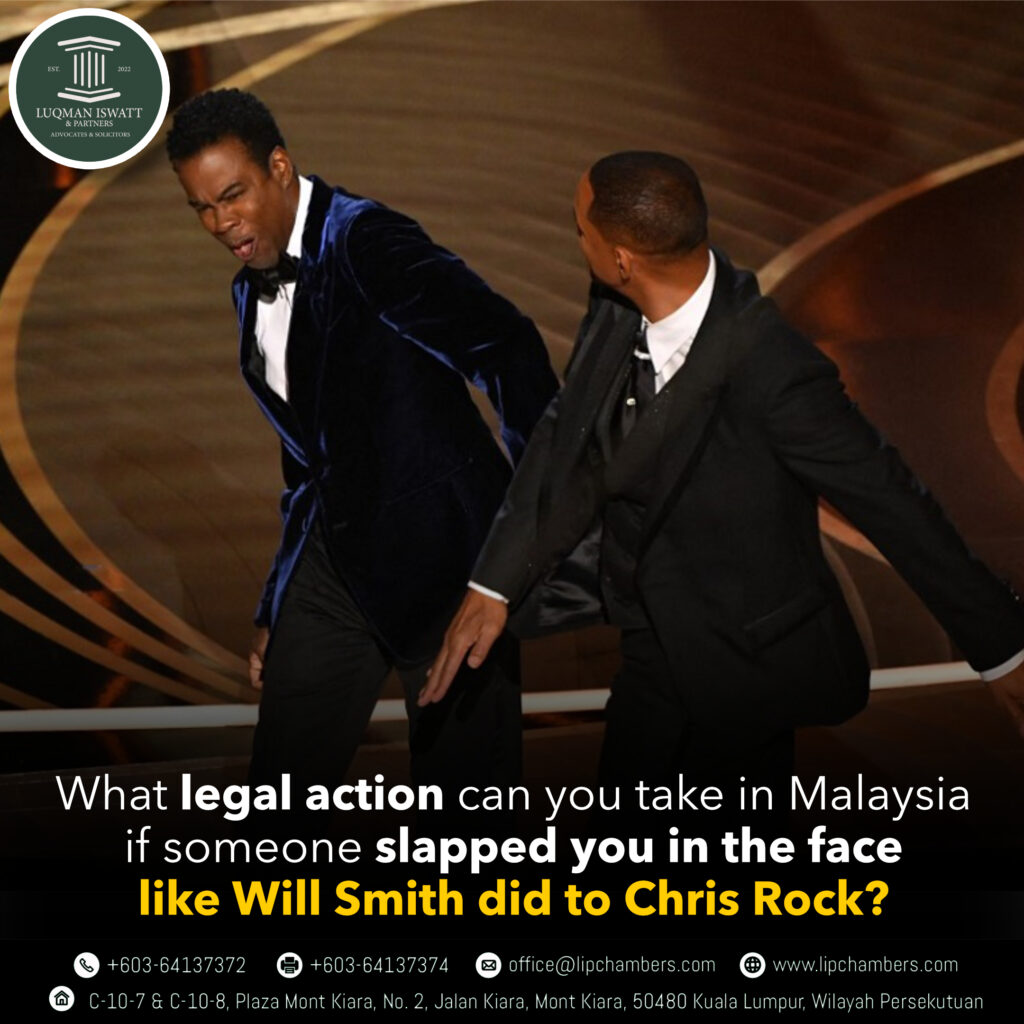
The recently held Academy Awards bear witness to one of the most shocking events in its 93-year long history. Global super star actor Will Smith (who won the Best Actor award the very same night) in a candid moment stormed the stage and struck host Chris Rock across the face for joking about his wife, Jada Pinkett Smith.
Of course, the incident left audiences worldwide stunned and in disbelief, especially after realising that the whole thing was not staged but in fact, a real outburst from the usually cool Smith. Furthermore, Smith’s foul-mouthed scolding of Rock in the immediate aftermath of the assault was also out of character for the actor, who is known for his ‘clean’ rap music that never utilised explicit or swear words.
However, we are not here to comment or gossip about Smith’s personal life or the incident and its fallout, which has since been well-documented in the international
media. Instead, as legal practitioners, we intend to look it from the viewpoint of the law and answer this hypothetical question:
Well, generally speaking, if a similar incident somehow happened to you in our country, you have two legal courses of action to choose from: criminal and civil. In fact, for the former, the individual doesn’t need to actually hit you physically for you to take legal action, as a verbal threat is also punishable by Malaysian law.
Furthermore, you can also take action under both criminal and civil, so that the individual can be slapped with the full force of the law for, well, slapping you.
Here’s everything you need to know:
If you choose the criminal route (as in not literally becoming a criminal but taking a course of action under criminal law), the first thing you have to do is to lodge a police report. The good folks at the Royal Malaysia Police (PDRM) will then investigate the incident and refer the matter to the Attorney-General’s Chambers (AGC) for further action.
It is then up to the AGC whether or not to proceed with a criminal charge against the perpetrator based on the facts and evidence of the case. Usually, a slap can be deemed as voluntarily causing hurt as prescribed by Section 321 of the Penal Code:
321. Whoever does any act with the intention of thereby causing hurt to any person, or with the knowledge that he is likely thereby to cause hurt to any person, and does thereby cause hurt to any person, is said “voluntarily to cause hurt”.
Therefore, the perpetrator can be charged under Section 323 of the Penal Code which prescribes as follows:
323. Whoever, except in the case provided for by section 334, voluntarily causes hurt, shall be punished with imprisonment for a term which may extend to one year or with fine which may extend to two thousand ringgit or with both.
Should the perpetrator be charged under this provision and be found guilty, the individual faces imprisonment for up to 1 year or fine of up to RM2,000 or both upon conviction.
The perpetrator may also be deemed as using criminal force by intentionally using force without consent and knowing that it would cause fear or annoyance to the victim. Section 350 of the Penal Code asserts:
350. Whoever intentionally uses force to any person, without that person’s consent, in order to cause the committing of any offence, or intending by the use of such force illegally to cause, or knowing it to be likely that by the use of such force he will illegally cause injury, fear, or annoyance to the person to whom the force is used, is said to use criminal force to that other.
Moreover, in certain instances, a criminal charge can also be initiated even if the perpetrator didn’t actually hit you, as it could still be deemed as an assault under Malaysian criminal law. Section 351 of the Penal Code prescribes as follows:
351. Whoever makes any gesture or any preparation, intending or knowing it to be likely that such gesture or preparation will cause any person present to apprehend that he who makes that gesture or preparation is about to use criminal force to that person, is said to commit an assault.
The provision further explains that mere words do not amount to an assault, but should the verbal threat be followed by a physical action, it can amount to an assault. In other words, if a person verbally said that he or she will slap you and then made a physical motion of an outstretched hand without hitting you, it can still be deemed as an assault.
For both criminal force and assault, the perpetrator can be charged under Section 352 of the Penal Code, where they face imprisonment of up to 3 months or fined up to RM1,000 or both if found guilty
Besides that, based on the circumstances surrounding the slap, it can also be deemed as committing criminal intimidation. In fact, a verbal threat to smack you in the face may be considered as the individual threatening you with an injury with intent to cause alarm.
Section 503 of the Penal Code prescribes:
503. Whoever threatens another with any injury to his person, reputation or property, or to the person or reputation of any one in whom that person is interested, with intent to cause alarm to that person, or to cause that person to do any act which he is not legally bound to do, or to omit to do any act which that person is legally entitled to do, as the means of avoiding the execution of such threat, commits criminal intimidation.
Hence, the person can be charged under Section 506 of the Penal Code for committing criminal intimidation. The punishment that they could face under this provision upon conviction are imprisonment of up to 2 years, fine or both.
You can also commence a civil suit against the perpetrator to seek personal loss or damages incurred, usually due to injuries suffered as a result from the incident. In certain special circumstances, you can also apply for a special injunction that prohibits the individual from being physically close to you.
This can be done concurrently or separate from the police investigation and the police report itself can be used as a written documentation for reference and evidence during the civil suit. Moreover, a civil suit may also require you to undergo medical examination, with the medical report serving as evidence for you having suffered injury from the incident.
The most probable action that can be taken is under tort law, specifically the Tort of Assault and Battery. It is actually quite similar to the aforementioned Penal Code provision as you don’t necessarily need to be physically hit, but a verbal and physical threat to cause bodily harm alone may suffice for an assault suit.
So, what’s the difference between assault and battery? Well, battery occurs when an individual intentionally touches another person with force in a harmful manner without the person’s permission. As for assault, it occurs when an individual acted and intended to cause apprehension or harmful contact, either verbal or physical. In assault, the threat must be imminent.
Besides the above, the civil suit may also seek compensation for the embarrassment caused by the incident. This can be in the form of a public apology from the perpetrator or even monetary compensation; especially if the incident garnered widespread publicity such as the Will Smith-Chris Rock incident.
However, do note that this article is meant to be viewed for hypothetical and informational purposes only. It should not be taken as legal advice as each case may have similar premises, but circumstances surrounding individual cases differ.
In fact, we have merely touched upon the matter at its surface level with the relevant legal provisions and procedures being much more complex. Hence, if you’ve suffered a similar incident to what Chris Rock had endured, we’d suggest for you to seek professional legal advice.
